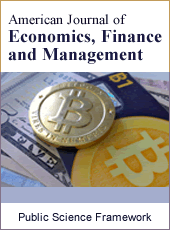American Journal of Economics, Finance and Management
Articles Information
American Journal of Economics, Finance and Management, Vol.1, No.6, Dec. 2015, Pub. Date: Oct. 27, 2015
Effects of Education on Economic Growth: Evidence from Pakistan
Pages: 579-585 Views: 3671 Downloads: 7549
[01]
Hina Ali, Department of Economics, the Women University, Multan, Pakistan.
[02]
Aasma Jabeen, Department of Economics, the Women University, Multan, Pakistan.
Deliberations on the issue reveal the significance of education in improvement of economic condition by disseminating quality education. The observations gathered by developing countries evince that education greatly influences economic development. The work chiefly aimed at identifying share the key macroeconomic variables contributed towards the growth of Pakistan's economy during the period from 1973-2013. Particular emphasis was laid down on four cardinal education levels specifically speaking Preliminary School Enrolment (PSE), Middle School Enrolment (MSE), Higher School Enrolment (HSE) and allied educational institute enrolment playing instrumental role in aggregate output. Several variables determine Basic Health Units (BHUs) as fundamental macroeconomics variables. It has been derived that the psychological behaviour of individuals emerges a chief driving force for financial development instead of ordinary school fulfilment, individual income and circulation of salary. The required size of progress makes it clear that end to the financial hole with mechanical nations will force major basic changes in educational organizations.
Gross Domestic Product, Education, Economic Growth, Pakistan
[01]
Abbas, Qaiser and James Foreman-Peck, (2007), “Human Capital and Economic Growth: Pakistan, 1960-2003” Under NRPU Projects by Higher Education Commission of Pakistan.
[02]
Abbas, Qaiser (2000), “The Role of Human Capital in Economic Growth: A Comparative Study of Pakistan and India” The Pakistan Development Review. Vol. No. pp 451-473.
[03]
Afza, Talat and Mian Sajid Nazir, (2007), “Human Competitiveness and Human Resource Development” Department of Management Sciences COMSATS Institute of Information Technology, Pakistan Economic and Social Review.
[04]
Babatunde, Musibau Adetunji and Adefabi, Rasak Adetunji (2005), “Long Run Relationship Between Education and Economic Growth in Nigeria: Evidence from the Johansen’s Coinegration Approach”. Regional Conference on Education in West Africa”.
[05]
Kerr, Roger (2001), “Education and Economic Growth” New Zealand Business Roundtable, Wellington.
[06]
Keuger, Alan, B and Mikael Lindhal (2001), “Education for Growth: Why and for Whom?” Journal of Economic Literature 6(2): 289-339.
[07]
Lattimore, Dr. Ralph (2002), “Education and Growth: the Seed and Flower of Economic Development” Education Forum.
[08]
Obradovic, Sasha “Education and Economic Growth”.
[09]
Papadenos, Lucas (2007), “Human Capital and Economic Growth” speech in 35th Economic Conference by National bank Vienna.
[10]
Petrakis, P. E., and D. Stamatakis (2002), “Growth and Educational Levels: A Comparative Analysis” Economics of Education Review 21(2): 513-521.
[11]
Stevens, Philip and Weale, Martin (2003), “Education and Economic Growth” International Handbook on the Economics of Education.
[12]
Sawada, Yasuyuki (1997), “Human Capital Investments in Pakistan: Implications of Micro Evidence from Rural Households” The Pakistan Development Review. Vol. No. pp 695-712.
[13]
Temple, Jonathan (2000), “Education and Economic Growth” Seminar on Economic Growth and Government Policy, 12 October 2000.
[14]
Teles, Vladimir Kuhl, and P. Andrade, Joaquim (2004), “Public Investment in Basic Education and Economic Growth” Universidade de brasilia, Instituto de ciencian, Humanas, Departmento de economia. www.highereducation.com
[15]
Afzal, M., Farooq, M. S., Ahmad, H. K., Begum, I., & Quddus, M. A. (2010). Relationship between school education and economic growth in Pakistan: ARDL bounds testing approach to cointegration. Pakistan Economic and Social Review, 39-60.
[16]
Lynch, R. G. (2004). Exceptional returns: Economic, fiscal, and social benefits of investment in early childhood development. Economic Policy Inst.
[17]
Hanushek, E. A., & Wößmann, L. (2007).The role of education quality for economic growth. World Bank Policy Research Working Paper, (4122).
[18]
Dickens, W. T., Sawhill, I. V., & Tebbs, J. (2006). The effects of investing in early education on economic growth. Brookings Institution.
[19]
Dănăcică, D. E., Belașcu, L., & Ilie, L. (2010). The interactive causality between higher education and economic growth in Romania. International Review of Business Research Papers, 6(4), 491-500.

ISSN Print: 2381-6864
ISSN Online: 2381-6902
Current Issue:
Vol. 5, Issue 3, September Submit a Manuscript Join Editorial Board Join Reviewer Team
ISSN Online: 2381-6902
Current Issue:
Vol. 5, Issue 3, September Submit a Manuscript Join Editorial Board Join Reviewer Team
| About This Journal |
| All Issues |
| Open Access |
| Indexing |
| Payment Information |
| Author Guidelines |
| Review Process |
| Publication Ethics |
| Editorial Board |
| Peer Reviewers |


